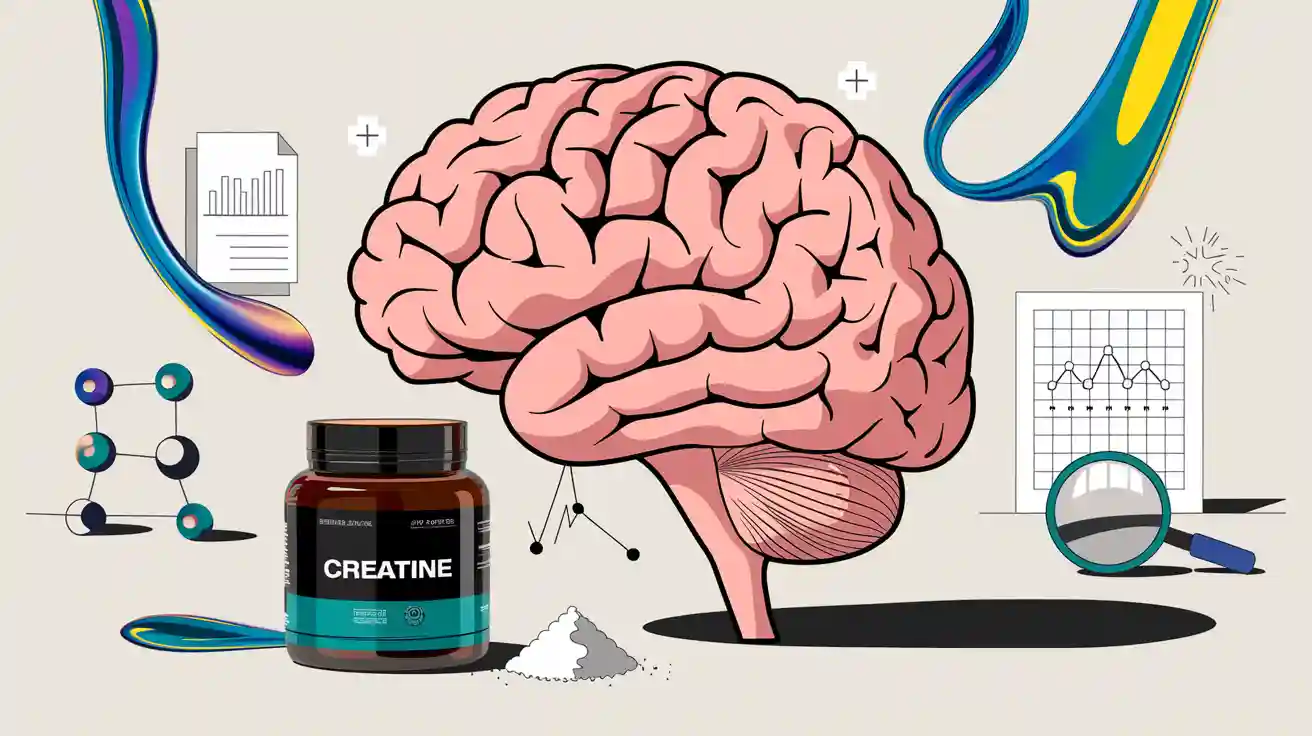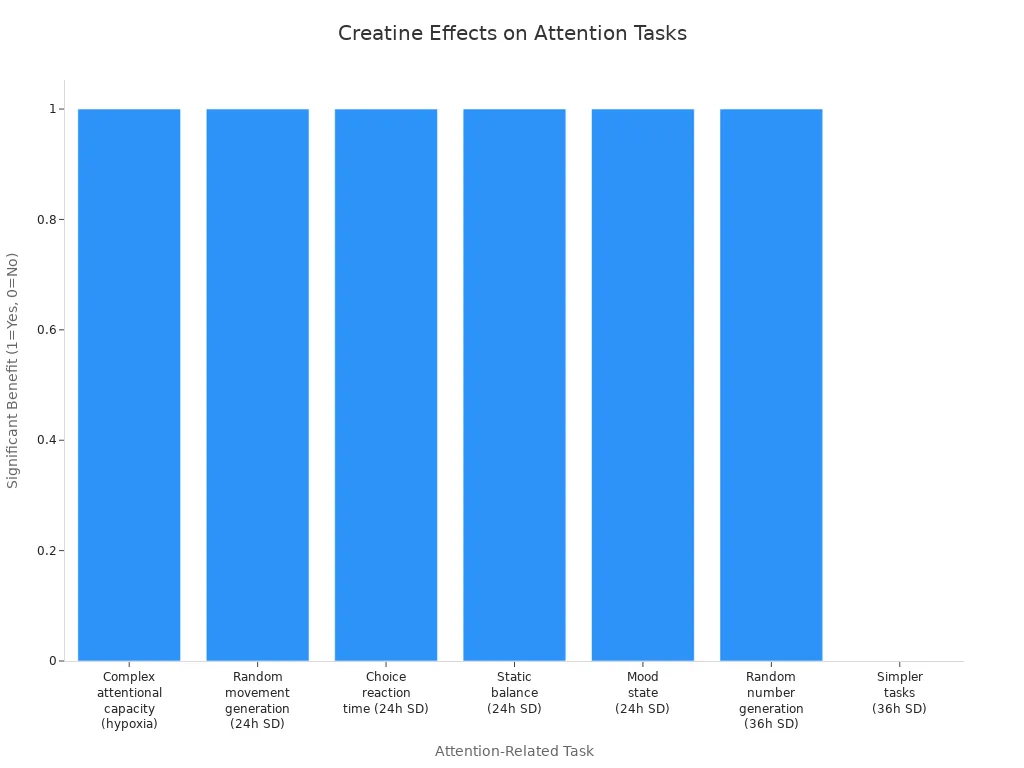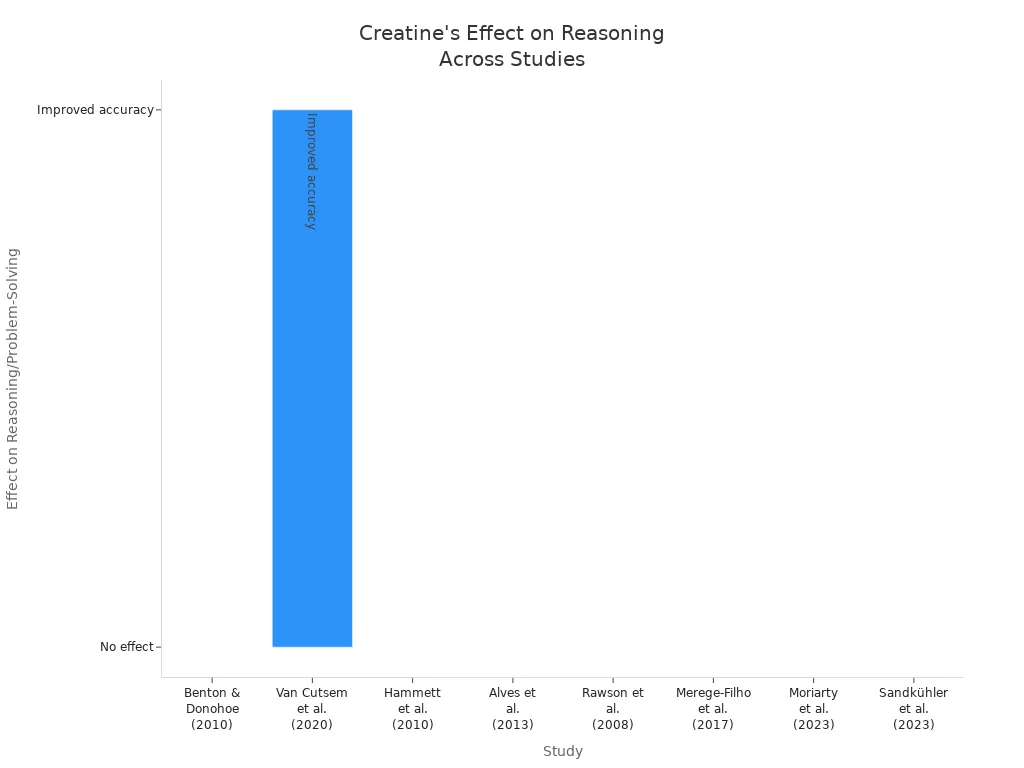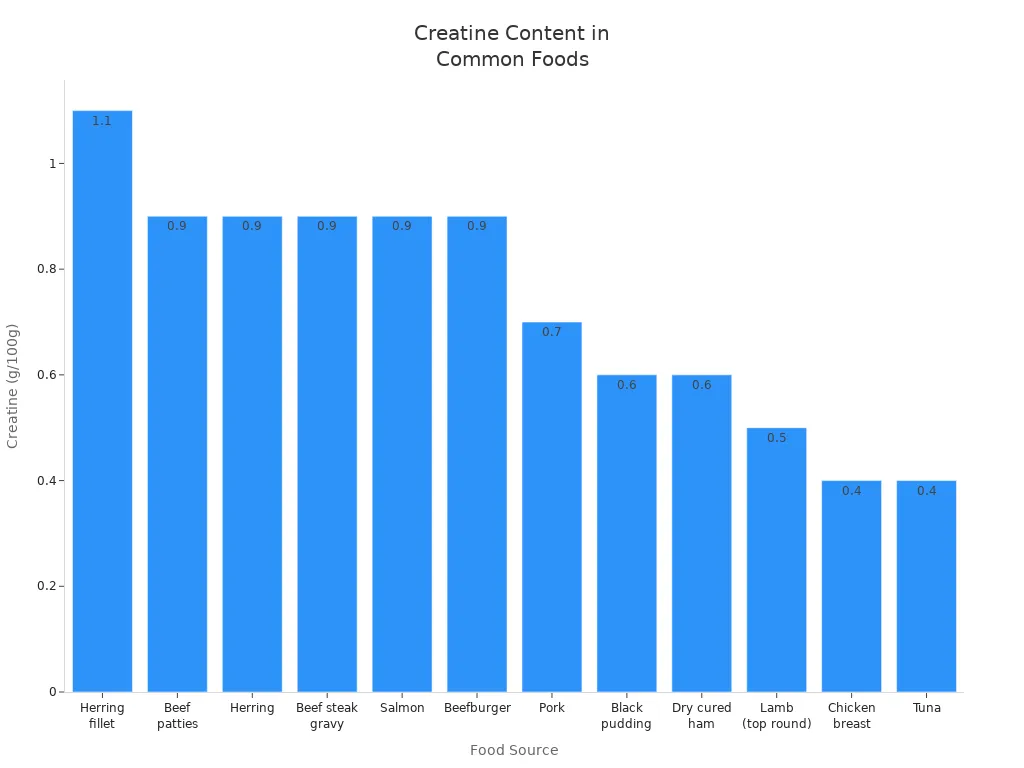
Recent creatine cognitive benefits research suggests creatine supplementation may offer advantages for memory and processing speed, especially in adults. Scientists found creatine can increase the brain’s energy supply and support neurotransmitter synthesis, such as acetylcholine. While creatine for brain health has gained popularity, research shows mixed results for attention and executive function. Individuals should consider both the benefits and risks before using creatine. The information provided serves for informational purposes only and does not substitute medical advice. Readers should consult a healthcare professional before making decisions about creatine or cognitive health.
Key Takeaways
Creatine supplementation can improve short-term memory and processing speed, especially in older adults and vegetarians.
Creatine helps the brain by boosting energy supply and supporting important brain chemicals.
Benefits of creatine are stronger during mental stress, like sleep deprivation or aging.
Creatine is generally safe for healthy adults but may cause mild side effects like stomach discomfort.
Vegetarians and vegans may gain more cognitive benefits from creatine due to lower dietary intake.
Creatine does not consistently improve reasoning or executive function in healthy young adults.
Older adults and people with neurological conditions might find creatine helpful for brain health.
Always consult a healthcare professional before starting creatine supplements to ensure safety and proper use.
Creatine cognitive benefits research
Research Overview
Recent creatine cognitive benefits research has expanded rapidly. Scientists have conducted numerous randomized controlled trials and systematic reviews to understand how creatine affects the brain and cognition. A recent systematic review and meta-analysis, registered under PROSPERO CRD42024533557 and following PRISMA 2020 guidelines, provides a comprehensive summary of the field. This review included 16 randomized controlled trials published between 1993 and June 2024. The studies involved 492 adults aged 20.8 to 76.4 years, covering both healthy individuals and those with diseases. Researchers focused on creatine monohydrate supplementation and assessed its impact on several cognitive domains.
Aspect | Details |
|---|---|
Study Type | Systematic review and meta-analysis |
Registration | PROSPERO CRD42024533557 |
Guidelines Followed | PRISMA 2020 |
Number of RCTs Included | 16 randomized controlled trials |
Publication Range | 1993 to June 2024 |
Participants | 492 adults aged 20.8–76.4 years, healthy and diseased populations |
Supplement Form | |
Cognitive Domains Assessed | Memory, executive function, attention, information processing speed |
Significant Positive Effects | Memory (SMD=0.31), Attention time (SMD=-0.31), Processing speed (SMD=-0.51) |
Non-significant Effects | Overall cognitive function, executive function |
Subgroup Findings | Greater benefits in diseased individuals, ages 18–60, females |
Intervention Duration | No significant difference between <4 weeks and ≥4 weeks |
Risk of Bias | Low to moderate |
Publication Bias | None detected (Egger’s test) |
Certainty of Evidence | Moderate for memory; low for other domains |
Conclusions | Creatine monohydrate supplementation shows beneficial effects on cognitive function, especially memory, attention, and processing speed. Larger trials needed. |
Researchers found that creatine supplementation may enhance brain energy supply through phosphocreatine, support neurotransmitter synthesis, and provide neuroprotection against oxidative stress. Some studies also noted sex-specific effects, with women showing greater improvements in processing speed. The review found no significant difference in cognitive benefits between short-term and long-term supplementation, suggesting that the effects of creatine on cognition may reach a plateau quickly.
Key Findings
Creatine cognitive benefits research highlights several important findings:
Short-term memory and intelligence/reasoning show the strongest and most consistent improvements with creatine supplementation.
Some studies report significant gains in:
Choice reaction time
Selective attention and inhibition
Short-term memory
These improvements often appear after protocols such as 20 grams per day for 7 days, especially in active individuals.
Mechanistic studies suggest creatine may reduce mental fatigue by improving brain energy metabolism. For example, researchers observed reduced oxygenated hemoglobin in the prefrontal cortex during cognitive tasks, indicating more efficient brain energy use.
Vegetarians tend to experience greater cognitive benefits, especially in memory-related tasks, compared to meat-eaters.
The review also suggests potential benefits for aging and stressed populations, supporting further research on creatine and cognitive performance.
Note: The strongest evidence supports improvements in short-term memory and intelligence/reasoning. Effects on other domains, such as long-term memory, spatial memory, attention, executive function, and reaction time, remain unclear or conflicting.
Mixed Evidence
Despite promising results, creatine cognitive benefits research shows mixed evidence and ongoing debate:
Researchers disagree on the strength and quality of evidence supporting creatine’s cognitive benefits. Many studies have small sample sizes or methodological limitations.
Some large, rigorous trials in neurological diseases, such as Parkinson’s, found no clinical benefit, while smaller studies reported positive effects.
The optimal dosing and duration for increasing brain creatine levels remain unknown.
Cognitive benefits may be more pronounced during periods of cognitive stress, such as sleep deprivation or complex tasks, but evidence in non-stressed populations is less clear.
Limitations in research design, lack of direct measurement of brain creatine content, and inconsistent results across cognitive domains contribute to uncertainty.
Some researchers express concern about overenthusiasm and relaxed evidence standards compared to pharmaceutical studies, which may distort public perception.
Unresolved questions include whether creatine supplementation helps recovery from mild traumatic brain injury and how best to measure its effects on cognition. Most experts agree that larger, well-designed trials are needed to clarify the effects of creatine on cognition and to identify which groups benefit most.
Creatine in the Brain
Energy Metabolism
Creatine plays a vital role in the brain’s energy system. Neurons need a constant supply of energy to support thinking, memory, and other cognitive processes. Creatine helps recycle adenosine triphosphate (ATP), which acts as the main energy source for cells. By supporting ATP recycling, creatine ensures that neurons have enough energy during demanding tasks.
ATP and Brain Function
Creatine naturally occurs in the body and in foods like meat and fish. Supplementation can increase creatine levels in the brain, much like it does in muscles.
Studies show that creatine crosses the blood-brain barrier, though only in small amounts. Researchers often use higher doses, such as 20 grams per day, to boost brain creatine levels in studies.
Creatine appears most helpful when the brain faces stress, such as sleep deprivation, aging, or neurodegenerative diseases. In these situations, neurons work harder and need more energy.
Research involving sleep-deprived people found that creatine improved cognitive performance, showing its role in supporting brain energy under fatigue.
A pilot study with 20 grams of creatine daily for eight weeks increased brain creatine and improved cognitive function, suggesting possible benefits for neurodegenerative conditions.
Meta-analyses indicate that creatine supplementation has little effect on young, healthy individuals in normal conditions but benefits those with higher brain energy demands.
Mitochondrial Effects
Study (Author) | Model/Subject | Intervention | Outcome | Evidence Type |
|---|---|---|---|---|
Zhu et al. | Animal (Ischemia) | 2% creatine diet for 4 weeks | Reduced brain infarct size | Animal model evidence |
Turner et al. | Human (Hypoxia) | 7-day oral creatine supplementation | Less cognitive decline, improved brain metabolism | Human clinical evidence |
Hausmann et al. | Animal (Spinal cord injury) | 4 weeks oral creatine | Improved locomotor function, less scar tissue | Animal model evidence |
Sullivan et al. | Animal (Traumatic brain injury) | Creatine injection or diet | Reduced brain tissue damage by 36-50% | Animal model evidence |
Prass et al. | Animal (Stroke) | Creatine-rich diet (up to 2%) for 3 weeks | 40% reduction in infarct size | Animal model evidence |
Sakellaris et al. | Human (Traumatic brain injury) | 0.4 g/kg/day creatine for 6 months | Improved cognition, behavior, self-care, reduced fatigue and headaches | Randomized human clinical trial |
Creatine supports mitochondrial function in the brain by enhancing mitochondrial creatine kinase activity. This enzyme helps transfer energy within cells, making ATP production more efficient. Creatine also reduces damage to mitochondrial membranes and lowers the production of harmful reactive oxygen species. These actions protect brain cells during stress, such as injury or disease. Creatine even acts as a direct antioxidant, sometimes working better than glutathione, a key natural antioxidant in the body. By supporting mitochondrial health, creatine helps maintain brain energy and protects against cell damage.
Neurotransmitter Impact
Creatine influences several neurotransmitter systems that affect mood, memory, and overall cognitive function.
Creatine modulates serotonin and dopamine systems, which play important roles in mood regulation.
It helps maintain GABAergic tone, supporting synaptic inhibition and protecting against overexcitation in the brain.
Creatine interacts with serotonin 1A and dopamine D1/D2 receptors, producing antidepressant-like effects.
Supplementation increases brain-derived neurotrophic factor (BDNF), which supports neurogenesis and synaptic plasticity.
Animal studies show creatine protects dopaminergic neurons from damage and boosts dopamine levels, which may improve mood.
Clinical trials report that creatine supplementation can raise plasma dopamine and improve mood in humans.
Creatine’s neuromodulatory effects involve multiple receptor systems, suggesting it acts as a broad neuromodulator in the central nervous system.
Note: The information in this article is for informational purposes only and does not constitute medical advice. Readers should consult a healthcare professional before making decisions about creatine supplementation or cognitive health.
Cognitive Benefits

Memory
Creatine supplementation shows a positive impact on memory, especially in older adults. Researchers conducted a systematic review and meta-analysis of eight randomized controlled trials. They found that creatine improved memory performance in healthy humans, with the strongest effects in people aged 66 to 76 years. The standardized mean difference for older adults reached 0.88, which means a noticeable improvement in memory tasks. Younger individuals did not show significant changes. The benefit appeared consistent regardless of dose, duration, sex, or location. Scientists believe creatine enhances brain bioenergetics, which helps boost cognition and memory.
Studies highlight that creatine most strongly affects short-term memory. People over 60 years old experience the greatest gains. Reasoning abilities also improve alongside short-term memory. There is no clear evidence for improvements in working memory or long-term memory.
Older adults benefit most from supplementation.
Short-term memory and reasoning show the greatest improvement.
Attention
The effect of creatine on attention remains less clear. Most studies do not show significant improvements in attention scores for adults. However, creatine may help maintain focus during tasks that require rapid information processing and high cognitive demand. Adults aged 18 to 60 years tend to see more cognitive benefits than older adults. The mechanism involves enhanced brain energy metabolism, which supports better cognitive performance during challenging tasks.
Researchers note that creatine helps maintain attention in environments with distractions. It also supports concentration during prolonged cognitive tasks and reduces mental fatigue. These effects allow people to sustain attention for longer periods.
Attention-Related Task | Effect of Creatine | Statistical Significance | Notes | |
|---|---|---|---|---|
Turner et al., 2015 (Hypoxia) | Complex attentional capacity during 10% oxygen breathing | Significant preservation of performance | Noted significant improvement | Creatine increased brain creatine by 9.2%, enhanced corticomotor excitability by ~70% |
McMorris et al., 2006 (Sleep deprivation 24h) | Random movement generation (executive function) | Improved adjacency score | p < 0.05 | Creatine group showed less impairment vs placebo |
McMorris et al., 2006 (Sleep deprivation 24h) | Choice reaction time | No deterioration ( | p < 0.05 | Faster reaction times with creatine |
McMorris et al., 2006 (Sleep deprivation 24h) | Static balance | Improved (fewer corrections) | p < 0.01 | Psychomotor skill benefit |
McMorris et al., 2006 (Sleep deprivation 24h) | Mood state (fatigue, vigor) | Lower fatigue, higher vigor | p < 0.005 (fatigue), p < 0.02 (vigor) | Better mood preservation |
McMorris et al., 2007 (Sleep deprivation 36h) | Random number generation (executive task) | Significant improvement over placebo | p < 0.05, progressive improvement p < 0.01 | Selective benefit on complex executive task |
McMorris et al., 2007 (Sleep deprivation 36h) | Simpler tasks (verbal recall, choice reaction time) | No significant effect | N/A | Creatine benefits selective to complex tasks |

Note: Creatine supplementation shows selective benefits for attention-related tasks, especially under cognitive stress such as sleep deprivation or hypoxia. Simpler tasks do not show significant improvement.
Processing Speed
Creatine supplementation can enhance processing speed, which refers to how quickly a person can complete cognitive tasks. Studies show that adults who take creatine perform better on tasks that require rapid decision-making and information handling. The improvement is most noticeable in situations with high cognitive demand, such as sleep deprivation or complex problem-solving.
Researchers suggest that creatine boosts cognitive performance by increasing the brain’s energy supply. This effect helps people respond faster and more accurately during challenging mental activities. Processing speed improvements appear more pronounced in adults aged 18 to 60 years and in individuals with medical conditions that affect brain energy.
Creatine supports faster reaction times.
Supplementation helps maintain accuracy during demanding cognitive tasks.
Benefits are greater in people with higher brain energy needs.
Medical Disclaimer: The information provided in this article is for informational purposes only and does not constitute medical advice. Readers should consult a healthcare professional before making any decisions regarding creatine supplementation or cognitive health.
Reasoning
Creatine’s effect on reasoning and problem-solving has attracted attention in recent years. Researchers have explored whether creatine supplementation can improve skills such as logical thinking, abstract reasoning, and executive function. These abilities help people solve problems, make decisions, and adapt to new situations.
Several studies have tested creatine’s impact on reasoning tasks. The table below summarizes findings from eight research studies:
Study & Population | Creatine Dose | Duration | Cognitive Domains Tested | Key Findings |
|---|---|---|---|---|
Benton & Donohoe (2010), Young adult females | 20 g/day | 5 days | Memory, reaction time, vigilance, word fluency | No significant effect on reasoning; vegetarians showed some memory improvement |
Van Cutsem et al. (2020), Young adults | 20 g/day | 7 days | Stroop, Flanker, visuomotor | Improved accuracy on Stroop color stimuli; no effect on executive function |
Hammett et al. (2010), Healthy young volunteers | 20 g/day loading + 5 g/day | 7 days | Working memory, fluid intelligence | Improvement in working memory only; no effect on fluid intelligence |
Alves et al. (2013), Older women | 20 g/day loading + 5 g/day | 24 weeks | Working memory, executive function | No significant cognitive improvements |
Rawson et al. (2008), Young adults | ~2.2 g/day | 6 weeks | Memory, alertness, logical reasoning | No significant differences |
Merege-Filho et al. (2017), Children | 14 g/day | 7 days | Working memory, executive function | No significant effects |
Moriarty et al. (2023), Healthy young adults | 10 or 20 g/day | 6 weeks | Processing speed, executive function | No effect of creatine supplementation |
Sandkühler et al. (2023), Healthy adults | 5 g/day | 6 weeks | Abstract reasoning, working memory | No significant effects |
Researchers found that creatine supplementation did not consistently improve reasoning or problem-solving abilities. Most studies reported no significant changes in logical reasoning, abstract thinking, or executive function. Some studies showed small improvements in working memory, especially in vegetarians, but these effects did not extend to reasoning tasks.

A systematic review of randomized controlled trials found that creatine may help short-term memory and intelligence, but results for reasoning and executive function remain mixed. Researchers suggest that creatine could support cognitive performance in aging or stressed populations, but larger studies are needed to confirm these effects.
Note: Creatine supplementation does not reliably improve reasoning or problem-solving in healthy adults. Effects may be more noticeable in people with higher brain energy needs, such as vegetarians or older adults.
Medical Disclaimer: The information provided in this article is for informational purposes only and does not constitute medical advice. Readers should consult a healthcare professional before making any decisions regarding creatine supplementation or cognitive health.
Who Benefits Most
Older Adults
Older adults often experience changes in memory and thinking skills as they age. Creatine supplementation can help this group by increasing levels of creatine and phosphocreatine in the brain. These changes support better neuropsychological performance and may slow cognitive decline. Studies show that older adults who take creatine maintain higher energy throughout the day and feel less mental fatigue. Researchers found that creatine helps improve processing speed and memory, especially in people over 60 years old. This supplement is safe, affordable, and may improve quality of life for the elderly. Creatine works by boosting brain energy reserves, which helps older adults stay alert and focused.
Tip: Older adults who want to support brain health may benefit from creatine supplementation, but should consult a healthcare professional before starting.
Sleep-Deprived
Sleep deprivation can make it hard to think clearly and react quickly. Creatine supplementation helps sleep-deprived individuals by supporting brain energy and improving cognitive performance. Researchers discovered that a single high dose of creatine during sleep deprivation improved processing capacity and short-term memory. The positive effects started about three hours after intake, peaked at four hours, and lasted up to nine hours. Sleep deprivation increases creatine uptake in the brain, making supplementation more effective under stress. People who took creatine after 24 hours without sleep showed less decline in reaction time, balance, and mood compared to those who did not. Creatine helps the brain recover energy quickly, which is important when sleep is lacking.
Creatine provides rapid energy for the brain without needing oxygen.
The benefits are most noticeable during periods of stress, such as sleep deprivation.
High doses may pose health risks, so individuals should use caution and seek medical advice.
More research is needed to find safe and effective dosing for sleep-deprived people.
Vegetarians/Vegans
Vegetarians and vegans usually have lower dietary creatine intake because they avoid meat and fish. However, their brain creatine levels remain similar to those of omnivores due to natural synthesis in the body. Studies show that creatine supplementation improves memory in vegetarians, but not in meat-eaters. The cognitive benefits may result from lower baseline creatine levels in vegetarians and vegans. Some research found that higher doses or longer supplementation periods may be needed to increase brain creatine and see greater cognitive improvements. Most improvements are modest and task-specific, such as better memory performance. Researchers suggest that vegetarians and vegans may benefit more from creatine supplementation than those who eat meat regularly.
Creatine supplementation improved memory in vegetarians, but not in omnivores.
Brain creatine levels are stable regardless of diet, but supplementation may help those with lower baseline levels.
Longer or higher-dose supplementation could optimize cognitive effects for vegetarians and vegans.
Note: The information provided is for informational purposes only and does not constitute medical advice. Readers should consult a healthcare professional before making decisions about creatine supplementation or cognitive health.
Neurological Conditions
Creatine supplementation attracts interest among people with neurological conditions. Researchers focus on Parkinson’s disease, depression, and other disorders that affect brain energy metabolism. Scientists believe creatine may help protect neurons and support cognitive function because it boosts cellular energy and mitochondrial health.
Studies in Parkinson’s disease show mixed results. Some clinical trials report that creatine alone does not slow disease progression or improve motor symptoms. However, certain studies find cognitive and psychiatric benefits, especially when creatine is combined with other supplements. For example, one randomized controlled trial found that patients with mild cognitive impairment who took creatine and coenzyme Q10 maintained their cognitive scores over 12 and 18 months. Another study observed improvements in mental function and mood in Parkinson’s patients who used creatine monotherapy.
Researchers also explore creatine’s effects on depressive symptoms. Some trials suggest that creatine may improve mood in neurological conditions. Scientists link these benefits to creatine’s role in neurotransmitter function and cellular energy metabolism.
The table below summarizes key findings from recent studies:
Study/Source | Population | Intervention | Cognitive Outcome | Psychiatric Outcome | Notes |
|---|---|---|---|---|---|
Li et al., 2015 (RCT) | PD patients with mild cognitive impairment | Creatine + Coenzyme Q10 | Delayed cognitive decline (MoCA scores maintained at 12 and 18 months) | N/A | Combination therapy showed cognitive benefits |
Bender et al., 2006 (RCT) | PD patients | Creatine monotherapy | Improved Mental UPDRS scores (P = 0.046) | Some improvement in depressive symptoms | Creatine alone showed limited motor benefits but some cognitive/psychiatric effects |
Meta-analysis (multiple RCTs) | PD patients | Creatine monotherapy vs placebo | No significant improvement in total, mental, ADL, or motor UPDRS scores | Limited evidence for psychiatric symptom improvement | Overall inconclusive for motor symptoms; cognitive/psychiatric effects need further study |
NINDS Exploratory Trials | Early PD patients | Creatine monotherapy (≥5 years) | No improvement in clinical outcomes | N/A | Well tolerated and safe but no clear cognitive benefit |
Researchers highlight several important points:
Creatine monotherapy does not slow Parkinson’s disease progression or improve motor symptoms.
Combination therapy with coenzyme Q10 shows significant cognitive improvements in patients with mild cognitive impairment.
Creatine may improve mood and depressive symptoms in neurological conditions.
Supplementation is generally safe and well tolerated, with mild gastrointestinal side effects.
Physical function may improve when creatine is combined with resistance training.
Preclinical studies in animals support creatine’s neuroprotective effects. Scientists observe less dopamine depletion and reduced brain tissue damage in animal models. These findings suggest creatine could help protect brain cells during stress or injury.
Note: Creatine supplementation may offer cognitive and psychiatric benefits for people with neurological conditions, especially when used with other therapies. However, current evidence remains limited and inconclusive. Researchers recommend further studies to confirm these effects and to identify which patients benefit most.
Medical Disclaimer: The information provided in this article is for informational purposes only and does not constitute medical advice. Readers should consult a healthcare professional before making any decisions regarding creatine supplementation or cognitive health.
Safety and Dosage
Recommended Dosage
Researchers have studied creatine for cognitive enhancement using different dosages and durations. Most clinical trials tested creatine supplements at 10 grams per day or 20 grams per day for six weeks. These amounts are higher than what athletes often use for muscle benefits. Scientists found that higher doses, such as 20 grams per day, can raise brain creatine levels more consistently. However, the link between increased brain creatine and improved cognitive function remains unclear. Many studies did not measure brain creatine directly, making it hard to set a standard dosage for cognitive benefits. Some experts believe longer supplementation or higher doses may help people with lower baseline brain creatine, such as vegetarians. At this time, there is no official recommended dosage for cognitive enhancement. More research is needed to find the best amount and duration for different groups.
Tip: Individuals should start with the lowest effective dose and consult a healthcare professional before using creatine supplements for cognitive purposes.
Side Effects
Creatine supplements are generally safe for most healthy adults, but side effects can occur. Studies show that people taking creatine report side effects more often than those taking a placebo. The risk of experiencing any side effect is about four times higher with creatine supplementation.
Short-Term
Short-term side effects usually appear within the first few weeks of taking creatine. Common complaints include stomach discomfort, bloating, and mild digestive issues. Some people notice muscle cramps or water retention. These effects tend to be mild and go away when the dosage is reduced or the supplement is stopped.
Long-Term
Long-term use of creatine supplements has not shown serious health risks in most studies. Researchers continue to monitor kidney and liver function in people who use creatine for extended periods. So far, healthy adults do not experience major problems when following recommended dosages. However, scientists caution that long-term safety data for older adults and those with medical conditions is limited.
Side Effect Type | Frequency | Notes |
|---|---|---|
Digestive issues | Common | Usually mild, short-term |
Muscle cramps | Occasional | Linked to water retention |
Kidney concerns | Rare | No major problems in healthy adults |
Liver concerns | Rare | No major problems in healthy adults |
Note: People with kidney or liver disease should avoid creatine supplements unless advised by a doctor.
Supplement Forms
Creatine comes in several forms. The most common type is creatine monohydrate, which researchers use in most cognitive studies. Other forms include creatine ethyl ester, creatine hydrochloride, and buffered creatine. Creatine monohydrate is affordable, widely available, and has the most scientific support for safety and effectiveness. Powder form mixes easily with water or juice. Capsules and tablets offer convenience for those who prefer not to mix powders.
Creatine monohydrate: Most studied, best for cognitive research
Creatine ethyl ester: Less common, may not absorb as well
Creatine hydrochloride: Easier to dissolve, less research available
Buffered creatine: Claims to reduce stomach upset, limited evidence
Tip: Choose creatine monohydrate for cognitive benefits, as it has the strongest research support.
Medical Disclaimer: The information provided in this article is for informational purposes only and does not constitute medical advice. Readers should consult a healthcare professional before making any decisions regarding creatine supplementation or cognitive health.
Common Concerns
For Athletes Only?
Many people believe that creatine is only useful for athletes who want to build muscle or improve sports performance. However, research shows that creatine offers benefits beyond the gym. Scientists have found that creatine plays a key role in brain energy metabolism. It helps improve memory, attention, and reduces mental fatigue, especially during stressful situations. These effects appear in healthy adults, vegetarians, and people with certain medical conditions. For example, studies show that creatine can help people with neurodegenerative diseases and mental health challenges. Some research even reports that creatine may reduce brain fog and help with concentration in people recovering from long Covid.
Creatine supports brain function by increasing the energy available to brain cells. This boost can help people think more clearly and stay focused. Mental health professionals have also studied creatine as an add-on to therapy for depression. Results suggest that people who take creatine with therapy may see greater improvements in mood than those who use therapy alone. These findings show that creatine is not just for athletes. Anyone looking to support their brain health may benefit, especially if they have lower baseline creatine levels, such as vegetarians or vegans.
Note: A daily dose of 3–5 grams of creatine monohydrate is often recommended to support brain energy and neuroprotection. Always seek advice from a healthcare professional before starting any supplement.
Weight Gain
Some people worry that creatine will cause unwanted weight gain. This concern comes from its well-known effect of increasing water content in muscles. When someone starts taking creatine, the body stores more water in muscle cells. This process can lead to a small increase in body weight, usually between 1 and 3 pounds. The weight gain is not due to fat but to water retention.
For most people, this mild weight gain does not affect daily life or health. The increase is temporary and often levels off after the first few weeks of supplementation. In studies focused on cognitive benefits, researchers did not report significant or harmful weight gain. People who use creatine for brain health usually take lower doses than athletes, which further reduces the chance of noticeable weight changes.
Weight gain from creatine is mostly water, not fat.
The effect is mild and temporary.
Lower doses for cognitive support make weight gain less likely.
Age Safety
Older adults often ask if creatine is safe for their age group. Current research supports the safety of creatine supplementation in older adults when taken in moderate amounts. Systematic reviews and meta-analyses show that creatine, especially when combined with resistance training, helps improve muscle mass, strength, and physical performance in this population. Even when used alone, creatine may offer benefits for muscle and brain health.
Studies have not found major safety concerns for older adults who use creatine at recommended doses. It may help slow age-related muscle loss and support bone health. Some research also suggests that creatine could help maintain cognitive function as people age. Experts recommend that older adults consult a doctor before starting creatine, especially if they have existing health conditions.
Medical Disclaimer: The information provided in this article is for informational purposes only and does not constitute medical advice. Readers should consult a healthcare professional before making any decisions regarding creatine supplementation or cognitive health.
Natural Sources
Creatine occurs naturally in many foods, especially those from animal sources. People get most of their dietary creatine from meat and fish. The body also makes creatine in the liver and kidneys. Together, these sources help maintain healthy creatine levels for muscle and brain function.
The following table shows the creatine content found in common animal-based foods:
Food Source | Creatine Content (g/100g) |
|---|---|
Herring fillet | 1.1 |
Beef patties | 0.9 |
Herring | 0.9 |
Beef steak gravy | 0.9 |
Salmon | 0.9 |
Beefburger | 0.9 |
Pork | 0.7 |
Black pudding | 0.6 |
Dry cured ham | 0.6 |
Lamb (top round) | 0.5 |
Chicken breast | 0.4 |
Tuna | 0.4 |

Most people who eat a balanced diet with animal products consume about 1–2 grams of creatine each day. This amount meets the average daily requirement for most adults. The body’s own production adds another 1–2 grams, which fills about 60–80% of muscle creatine stores. Vegetarians and vegans get less creatine from food, since plant-based foods contain almost no creatine. Their bodies rely more on internal synthesis.
Cooking meat can lower creatine content. Some creatine leaks into meat juices or sauces during cooking. Eating these juices helps retain more creatine from meals.
Supplements provide a much higher dose than food. People often take 3–5 grams of creatine monohydrate per day for maintenance. During a loading phase, some take up to 20 grams daily for a short period. To match a 5-gram supplement dose, a person would need to eat about 1 kilogram of steak. This amount is not practical for most people.
Key points about natural sources of creatine:
Animal-based foods are the richest sources.
Plant foods do not contain creatine.
Cooking reduces creatine in meat, but sauces help retain it.
Typical diets provide enough for basic needs, but not for higher performance or therapeutic goals.
Supplements offer a concentrated and convenient way to increase creatine intake.
Note: Natural creatine intake from food and body synthesis is usually enough for most people. Those with higher needs, such as athletes or older adults, may benefit from supplements. Vegetarians and vegans may see greater effects from supplementation due to lower dietary intake.
Medical Disclaimer: The information provided in this article is for informational purposes only and does not constitute medical advice. Readers should consult a healthcare professional before making any decisions regarding creatine supplementation or cognitive health.
Should You Use Creatine?
Weighing Pros and Cons
Creatine supplementation offers both potential benefits and drawbacks for cognitive health. People interested in brain support should consider these factors before making a decision.
Potential Benefits:
May improve short-term memory, especially in older adults and vegetarians.
Can support processing speed and attention during periods of stress, such as sleep deprivation.
Shows promise for people with certain neurological conditions.
Generally safe for healthy adults when used at recommended doses.
Possible Drawbacks:
Evidence for cognitive benefits remains mixed, especially in healthy young adults.
Some people experience mild side effects, such as stomach discomfort or water retention.
Long-term safety data for older adults and those with health conditions is limited.
Supplements may interact with medications or existing health issues.
Benefit | Who May Benefit Most | Evidence Strength |
|---|---|---|
Memory improvement | Older adults, vegetarians | Moderate |
Processing speed | Sleep-deprived, stressed | Moderate |
Mood support | Neurological conditions | Low to moderate |
General cognition | Healthy adults | Low |
Tip: People should weigh these pros and cons based on their own health status and goals.
Personalized Advice
Each person’s situation is unique. Before starting creatine for cognitive health, individuals should ask themselves a few key questions:
Do they belong to a group that research shows may benefit, such as older adults, vegetarians, or those under cognitive stress?
Have they discussed their interest in creatine with a healthcare provider?
Are they aware of possible side effects and willing to monitor their health during supplementation?
Do they have any medical conditions, especially kidney or liver issues, that could increase risk?
Checklist for Considering Creatine:
Review personal health history.
Identify specific cognitive goals.
Start with the lowest effective dose if advised.
Monitor for side effects and adjust as needed.
Note: The information in this article is for informational purposes only. It does not constitute medical advice. Readers should consult a healthcare professional before making any decisions regarding creatine supplementation or cognitive health.
Creatine may improve memory and processing speed, especially in older adults, vegetarians, and those under cognitive stress. Evidence for other cognitive benefits remains mixed. Most healthy adults tolerate creatine well, but side effects can occur. Individuals should consult a healthcare professional before starting supplementation.
Medical Disclaimer: The information in this article is for informational purposes only. Readers should seek advice from a healthcare professional before making decisions about creatine or cognitive health.
FAQ
What is creatine?
Creatine is a natural compound found in muscles and the brain. The body makes creatine, and people also get it from foods like meat and fish. Creatine helps cells produce energy.
Can creatine improve memory?
Research shows creatine may help improve short-term memory, especially in older adults and vegetarians. The effect on long-term memory remains unclear. Results vary between studies.
Is creatine safe for teenagers?
Scientists consider creatine safe for healthy teenagers when used at recommended doses. Teenagers should talk to a healthcare professional before starting any supplement.
Does creatine cause weight gain?
Creatine can cause mild weight gain due to water retention in muscles. This increase is usually small and temporary. Most people do not gain fat from creatine.
How long does it take to see cognitive benefits?
Some studies report cognitive improvements within one week of supplementation. Effects may appear faster during periods of stress, such as sleep deprivation. Results depend on age and health.
Should vegetarians take creatine supplements?
Vegetarians may benefit more from creatine supplements because their diets contain less creatine. Supplementation can help improve memory and processing speed in this group.
Can creatine help with depression?
Some research suggests creatine may support mood and reduce depressive symptoms. Scientists continue to study this effect. People with depression should consult a healthcare provider before using creatine.
What is the recommended dose for cognitive benefits?
Most studies use 5–20 grams of creatine per day for cognitive research. The best dose depends on age, diet, and health. Always start with the lowest effective dose.
Medical Disclaimer: The information in this FAQ is for informational purposes only. It does not replace medical advice. Readers should consult a healthcare professional before making decisions about creatine supplementation or cognitive health.


